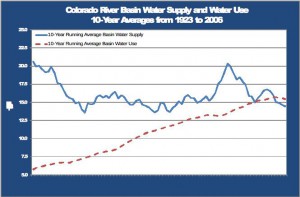Michael Campana prodded me a bit this morning on Waterwired regarding a discussion happening here and elsewhere about the possibility of abandoning Phoenix as the place runs out of water. It’s a strong meme, and it comes up frequently among those who recognize the fragile nature of cities of the desert southwest as growth-fueled water demand rises while climate change appears likely to reduce future supply.
This applies across the southwest, and I don’t mean to single out Phoenix. It’s just a handy example of a big problem, which you can see here in a nutshell (thanks to Terry Fulp at the USBR for sharing the latest version of this graph). You can imagine the trend lines continuing in their respective directions, and Phoenix drying up and being abandoned, dust bowl style.
As I explained over in the comments at Michael’s, here is why I think that is not likely to happen, and what interests me about the current discussion of alternative paths forward.
If one quantifies all the water there is available to the lower basin states, and looks at how that water is now being used, one can a number of solutions short of shutting Phoenix (or Las Vegas, Nev., or Albuquerque) down. We know, for example, that Phoenix could consume far less water per capita. There could be a major shift of water from ag to urban users in Arizona and the rest of the West. We could pursue coastal desalination, freeing up Colorado River water. These things are all too expensive and/or politically painful now to contemplate, but they are far less expensive and politically painful than abandoning Phoenix etc. There will reach a crossover point on my hypothetical cost/pain curve where these solutions, or steps like them, will be implemented.
The question I’m thinking hard about is what the political/policy/institutional/engineering framework looks like that we’ll need to have in place to sensibly handle the transition when we hit that point on the pain curve.


Expensive (financially or otherwise) water (and global warming) will make Phoenix more expensive, so it will shrink. No policies (except NO subsidies) necessary to “manage” that process.
I too don’t think we’ll ‘abandon’ cities. They will depopulate, but not become ghost towns.
Best,
D
@DZ – No policies are necessary, but what do you think are the chances that Arizona’s politicians will sit idle and watch that happen? I’d put the probability at or near zero. The worrisome thing about the SW water crisis is not how Phoenix will fare, but what disastrous public policies will be advanced in desperate attempts to forestall the inevitable, and how Arizona will try to shift the costs to others.